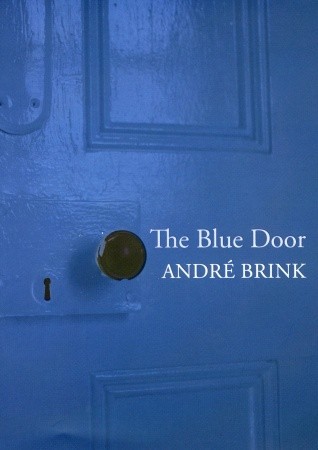On the back of André Brink’s The Blue Door there’s a quote from Nadine Gordimer referring to it as a novel but, at 122 pages, it has even less of a claim to novelhood than Ian McEwan‘s On Chesil Beach. Not that concerns about size should shadow content, but it’s also a book capable of fitting into a small pocket and, at £10.99, one can’t help feel it it’s way overpriced for what it is. But that cover, with its simple blue door, just begs to be opened, if only to find out what lies beyond. Because a peek through the keyhole would never do.
The Blue Door bills itself as that age old staple of storytelling: the ‘what if..?’ And here, the what if concerns the life of our narrator, David le Roux, a teacher turned artist. One day he’s married to Lydia sans children and then the next he’s married to a black woman called Sarah and has two loving children. It is, as he puts it, “the kind of moment that once turned the life of Kafka’s Gregor Samsa upside down.”
The reference to Kafka is a knowing one, as his influence is certainly here. David’s attempts to chase up his life with Lydia find him lost and confused in a disorientating world where buildings change – and disappear! – and men age visibly in a matter of minutes. In fact, the novel begins with a dream where David, Lydia, and three imagined daughters are moving house but, when he goes to fetch water for them, he is left behind. And from here on what’s dream (or delusion) and what’s real is very much a mystery. But one can’t help feel that David isn’t all too bothered about solving it and is, instead, resigned to his predicament:
In the morning, I think, I shall return to her. And take my time. To inspect everything that makes her. Her eyes and mouth and ears. Her shoulders, her arms and hands, each finger separately. Her nipples. Down to her toes. Everything. Everything. I must know who she is. I must find out what it means to say; “Sarah”.
While the situation springs from Kafka, the treatment is reminiscent of Kundera. David fusses over realistic questions about his new life – how do you enter the bed of your wife of nine years when you’ve only just met her? – while making some sort of sense of his new world. Brink explores the questions one might have when put in such a predicament, questioning the understanding of those in relationships and finding the point in which a person ends and who they think they are begins.
The Blue Door, at about an hour’s read, is packed with detail that swings between the realistic and in pursuit of metaphor. Colours, objects, people – all these are ripe for symbolism, although I didn’t quite get them all. But for all its texture, I didn’t experience the depth I had hoped for and felt that Brink had left too many loose ends for it to be ultimately satisfying. Perhaps its questions are designed to linger long after reading The Blue Door but I’m more inclined to lock it up and throw away the key.

Hmmm – I thought I had commented on this the other day, but I think perhaps I just thought the thought without typing it!
Anyway – this sounds a bit of a disappointment. I really like Brink usually. A while ago I gathered up all of his that my library could offer. I particularly enjoyed ‘An Instant in the Wind’ and also ‘The Other Side of Silence’ (although it was one of the bleakest books I’ve ever read!).
jem,
It may just be that I’m new to Brink and, as such, haven’t chose a good place to start with, in the same way that many authors would seem to have entry level novels, before tackling the heavyweight stuff.
Not that The Blue Door is heavyweight, but it may just be an further exploration of themes, motifs, and symbols that, not being versed in Brink, simply passed me by thus reducing the possible enjoyment of the whole. It kept me reading, never really setting it down, but I can’t say I overly loved it.